小学英语期末复习一般现在时,第三人称单数等
英语动词时态 一般现在时 第三人称单数形式

一般现在时态概念表示经常、反复、习惯性的动作或行为,也表示现存状况或客观真理。
结构主语+be动词、行为动词等句型I)当主语是第三人称单数时(he /she /it)肯定句单三主语+单三谓语+……He likes English.否定句单三主语+doesn't + 动词原形+……He doesn't likes English. 一般疑问句Does + 单三主语+ 动词原形+…… ?Does he likes English?肯定回答Yes , 单三主语+does Y es , he does.否定回答No , 单三主语+doesn't No , he doesn't.特殊疑问句疑问词+ 一般疑问句What does he like?特殊疑问句回答整句或关键词He likes English.II)当主语是其他人称时(I /we /you /you /they) 肯定句其他主语+ 动词原形+……They like English.否定句其他主语+don't + 动词原形+……They don't likes English. 一般疑问句Do + 其他主语+ 动词原形+……?Do they like English?肯定回答Yes , 其他主语+ do Y es , they do.否定回答No , 其他主语+ don't No , they don't.特殊疑问句疑问词+ 一般疑问句What do they like?特殊疑问句回答整句或关键词They like English.概念表示现在正在进行的动作或行为。
结构be动词+现在分词句型肯定句主语+be+现在分词+……He is reading English.否定句主语+be not +现在分词+……He isn't reading English.一般疑问句Be + 主语+现在分词+……? Is he reading English?肯定回答Yes , 主语+be Y es , he is.否定回答No , 主语+be not No , he isn't.特殊疑问句疑问词+ 一般疑问句What is reading?特殊疑问句回答整句或关键词He is reading English. /English.概念表示将来某个时间将要发生的动作或存在的状态,也表示将来经常或重复发生的动作。
小学六年级英语 四大时态总复习 练习

小学英语四种时态复习一提到时态,就必然用到动词。
首先要明确两个概念:动词有五种形式,即:原形(形式),第三人称单数(形式),过去式(形式),现在分词(形式),过去分词(形式).小学阶段,句子有以下四种常见时态,即:一般现在时态;一般过去时态;一般将来时态;现在进行时态。
式,意思就是各种不同的形式,是对应着动词来说的;时态,意思就是表达各种不同的时间的事情,是对应着句子来说的。
式与时,先搞懂区别。
一、一般现在时态一般现在时用法口诀一般现在时,every, usually, often, sometimes.第一、二人称和复数,动词原形不变换.除了I, you,复数外,动词后加s(es)别忘怀。
要变一般疑问句,be动词提前很容易.若是没有be动词,Do和Does开头要注意。
否定句,很简单,not 在be 动词后面站。
若是没有be动词,do, does加not 要牢记。
请把这些规律记,一般现在时没问题。
一般现在时态,可能是两种意思.第一,表示经常性的动作,常与often, sometimes, usually, every day, everyweek, every month, every year等表示频率的副词连用。
例如:He often goes swimming in summer。
I usually go to work by bike.Sam visits China every year。
第二,表示现在的状态。
如:My mother is a worker.There is a computer in our classroom。
注意问题:be (am, is, are)动词就是独立的谓语动词,一个句子中有了be(am, is, are)就有了谓语动词了.句子中不能同时出现两个谓语动词.不少同学经常出这样的错误:The boy is often eats hamburgers。
(错)应改为: The boy often eats hamburgers。
小学英语动词第三人称单数形式用法详解

一般现在时中的第三人称单数形式(一)在一般现在时中,当主语是第三人称单数时,谓语动词要用第三人称单数形式,即常在动词原形后加-s或-es。
(一)什么是一般现在时?一般现在时的基本用法有哪些呢?【一般现在时的功能】1.表示事物或人物的特征、状态。
如:The sky is blue.天空是蓝色的。
2.表示经常性或习惯性的动作。
如:I get up at six every day.我每天六点起床。
3.表示客观现实。
如:The earth goes around the sun.地球绕着太阳转。
(二)哪些主语是第三人称单数? 现归纳总结如下:一、人称代词he, she, it是第三人称单数。
如:He likes watching TV. 他喜欢看电视。
he has lunch at twelve. 她十二点吃午餐。
It looks like a cat. 它看起来像只猫。
二、单个人名、地名或称呼作主语;是第三人称单数。
如:①Han Mei looks like her mother. 韩梅看起来像她的母亲。
②Beijing is in China. 北京在中国。
③Uncle Wang often makes cakes. 王叔叔经常做蛋糕。
三、单数可数名词或"this / that / the+单数可数名词"作主语时,是第三人称单数。
如:①A horse is a useful animal. 马是有用的动物。
②This book is yours. 这本书是你的。
③That car is red. 那辆小汽车是红色的。
④The cat is Lucy's. 这只猫是露茜的。
四、不定代词someone, somebody, nobody, everything, something等及指示代词this,that作主语时,是第三人称单数。
如:①Everyone is here. 大家到齐了。
小学英语动词第三人称单数形式用法详解

般现在时中的第三人称单数形式在一般现在时中,当主语是第三人称单数时,谓语动词要用第三人称单数形式,形后加-s或-es。
(一)什么是一般现在时?一般现在时的基本用法有哪些呢?【一般现在时的功能】1. 表示事物或人物的特征、状态。
如:The sky is blue.天空是蓝色的。
2. 表示经常性或习惯性的动作。
如:I get up at six every day.我每天六点起床。
标志词(时间状语):always, every week (day, year, month …),once a week, every …,sometimes, at …,on Sun day uausllyoften,never,hardly.........3. 表示客观现实。
如:The earth goes around the sun.地球绕着太阳转。
(二)哪些主语是第三人称单数?现归纳总结如下:、单个人名、地名或称呼作主语;是第三人称单数。
如:①Han Mei looks like her mother. 韩梅看起来像她的母亲。
②Beiji ng is in Chi na. 北京在中国。
即常在动词原人称代词he, she, itHe likes watch ing TV. he has lunch at twelve. It looks like a cat. 是第三人称单数。
如:他喜欢看电视。
她十二点吃午餐。
它看起来像只猫。
③Uncle Wang ofte n makes cakes. 王叔叔经常做蛋糕。
① A horse is a useful animal.四、不定代词 someone, somebody, nobody, everything, something that 作主语时,是第三人称单数。
如:① Everyone is here. 大家到齐了。
② There is something wrong with the watch.③ This is a pen. 这是一支钢笔。
一般现在时第三人称单数、疑问句
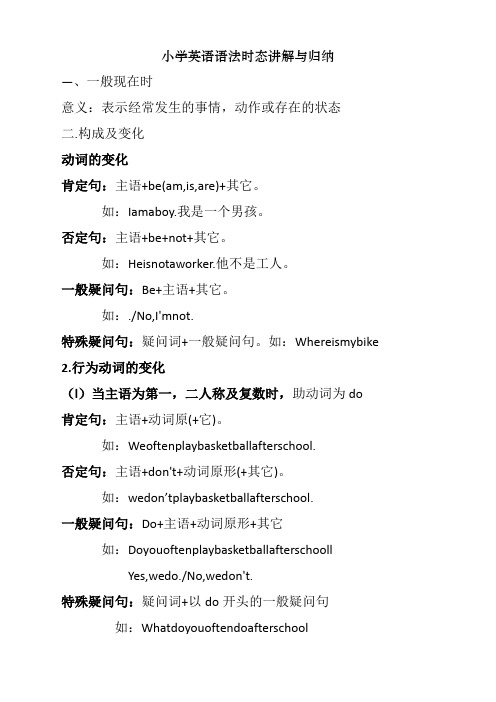
小学英语语法时态讲解与归纳—、一般现在时意义:表示经常发生的事情,动作或存在的状态二.构成及变化动词的变化肯定句:主语+be(am,is,are)+其它。
如:Iamaboy.我是一个男孩。
否定句:主语+be+not+其它。
如:Heisnotaworker.他不是工人。
一般疑问句:Be+主语+其它。
如:./No,I'mnot.特殊疑问句:疑问词+一般疑问句。
如:Whereismybike 2.行为动词的变化(l)当主语为第一,二人称及复数时,助动词为do肯定句:主语+动词原(+它)。
如:Weoftenplaybasketballafterschool.否定句:主语+don't+动词原形(+其它)。
如:wedon’tplaybasketballafterschool.一般疑问句:Do+主语+动词原形+其它如:DoyouoftenplaybasketballafterschoollYes,wedo./No,wedon't.特殊疑问句:疑问词+以do开头的一般疑问句如:Whatdoyouoftendoafterschool(2)当主语为第三人称单数时,助动词为does肯定句:主语+动词三单式(+其它)。
如:Heswimswell.否定句:主语+doesn’t+动词原形(+其它)。
如:Hedoesn’tswim well.一般疑问句:Does+主语+动词原形+其它。
如:DoesheswimwellYes,hedoes./No,hedoesn't.特殊疑问句:疑问词+以does开头的一般疑问句如:Howdoesyourfathergotowork三.第三人称单数的动词变化规则(只有在第三人称为主语的肯定句中,动词才用三单式)(1)多数动词直接加s:runs getslikescolletstakesplays climbs…….(2)结尾是s,x,sh,ch,o,前为辅音字母,结尾加es:watches teaches goes does washes crossesmixes brushes(3)动词末尾y前为辅音:将y改为i加es:study→studiesfly→fliescarry→carriescry→cries但在y前如果为元音则直接加s:buyssays四.时间标志:always,usually,often,so metimes,every…一般现在时练习Heoften (have)dinnerathome. DanielandTommy (be)inClassOne.We (notwatch)TVonMonday.Nick (notgo)tothezooonSunday.they (like)theWorldCupWhattheyoften (do)onSaturdaysyourparents(read)newspaperseverydayThegirl (teach)usEnglishonSundays.SheandI(take)awalktogethereveryevening.There(be)somewaterinthebottle.Mike____(like)cooking.They____ (have)thesamehobby.Myaunt____(look)afterherbabycarefully. Youalways______(do)yourhomeworkwell.I (be)’mstayinginbed.She (go)toschoolfromMondaytoFriday.LiuTao_____(do)notlikePE.Thechildoften_____(watch)TVintheevening. SuHaiandSuYang____(have)eightlessonsthisterm.-Whatday___(be)ittoday-It’sSaturdayWinter, spring, summer and autumn (be)seasons.Danny (take) off his T-shirt now.Today (teach) a science lesson.Jenny and I (live) in Canada.Jenny (want) to go to school in chinaLet me (help) youShe eats a sandwich(总是)Li Ming goes to school by bicycle(有时)。
小学英语的四种时态知识点
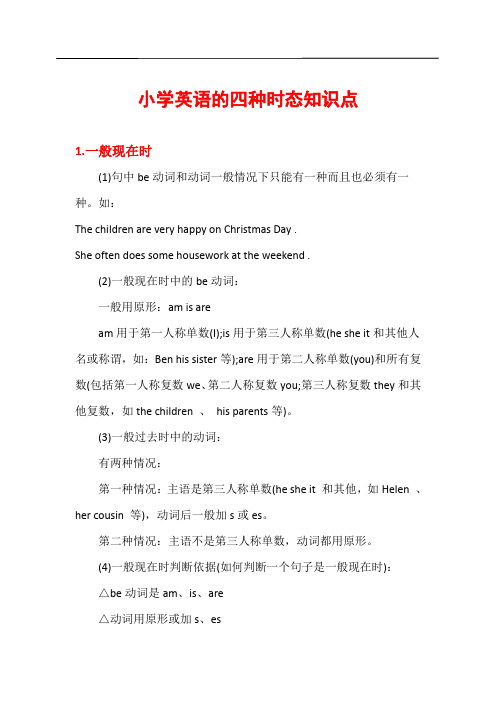
小学英语的四种时态知识点1.一般现在时(1)句中be动词和动词一般情况下只能有一种而且也必须有一种。
如:The children are very happy on Christmas Day .She often does some housework at the weekend .(2)一般现在时中的be动词:一般用原形:am is aream用于第一人称单数(I);is用于第三人称单数(he she it和其他人名或称谓,如:Ben his sister等);are用于第二人称单数(you)和所有复数(包括第一人称复数we、第二人称复数you;第三人称复数they和其他复数,如the children 、his parents等)。
(3)一般过去时中的动词:有两种情况:第一种情况:主语是第三人称单数(he she it 和其他,如Helen 、her cousin 等),动词后一般加s或es。
第二种情况:主语不是第三人称单数,动词都用原形。
(4)一般现在时判断依据(如何判断一个句子是一般现在时):△be动词是am、is、are△动词用原形或加s、es△没有时间状语或有usually、often、everyday、sometimes等不是具体的时间(5)有用的的依据:Be动词是is、am ←→名词用原形(这里包括可数名词的单数和不可数名词)Be动词是are ←→名词加s或es动词加s或es ←→主语是第三人称单数动词用原形←→主语不是第三人称单数(6)情态动词:我们现在学过的情态动词有:can、must、should、would。
情态动词后动词总是用原形。
(不受其他任何条件影响)2.一般过去时(1)句中be动词和动词一般情况下只能有一种而且也必须有一种。
如:The girls were on the grass just now .They visited my parents last weekend .(2)一般过去时中的be动词:一般用过去式:was werewas用于第一人称单数(I)和第三人称单数(he she it和其他人名或称谓,如:Ben 、his sister等);were用于第二人称单数(you)和所有复数(包括第一人称复数we、第二人称复数you;第三人称复数they 和其他复数,如the children 、his parents等)。
英语一般现在时主语第三人称单数,谓语动词变化教学

详细描述您的妙招是什么,如何准备?
首先对于have变has,我编了口诀,我有,你有,大家有,用have,他有,她有, 它它有,用has。而对于其它谓语动词,首先得分析主语是否是第二人称单数,那我教 学生们偷偷在翻译的时候在后面加个ta,能加成功的就是三单。
实施过程
介绍妙招在课堂中的使用方法(如什么时机使用,教师应注意什么)
妙招名称
分层作业的布置
妙招针对的重 难点问题
学段
学科
教材版本
-^1-II
早R
针对的
重难点问题名称
五年级
英语
一般现在时主语第三人 称单数,语动词变化
背景介绍
介绍妙招生成的背景,针对工作中的什么困惑?
学生在教完一般现在时以后对于主语是第三人称的时候,谓语动词的三单形式老是忘 记,怎样才能让学生记牢呢?
比如在主语是三单和非三单的对比情况下使用,让题目形成鲜明对比学生更容易接受。
六年级英语下册期末复习语法

5.不规则动词过去式: am,is-was, are-were, do-did, see-saw, say-said, give-gave, get-got, go-went, come-came, have-had, eat-ate, take-took, run-ran, sing-sang, put-put, make-made, read-read, writewrote, draw-drew, drink-drank, fly-flew, ride-rode, speak-spoke, sweep-swept, swim-swam, sitsat teach-taught feel – felt
4 、特殊疑问句:以特殊疑问词( what , where , who , which , when , whose , why , how 等)开头引导的句子。此类句子应该 问什么就答什么,不能用“yes 、no”来回 答。如: What is this? It’s a computer. What does he do? He’s a doctor. Where are you going? I’m going to Beijing. Who played football with you yesterday afternoon? Mike.
三、否定句:在be动词(am, is, are)l后加 not或情态动词will后加not成won’t。
一般过去时 1.一般过去时表示过去某个时间发生的动作或 存在的状态,常和表示过去的时间状语连用。一 般过去时也表示过去经常或反复发生的动作感谢。 如: yesterday ,last( weekend ,month ,year…) be used to 2.Be动词在一般过去时中的变化: ⑴am 和is在一般过去时中变为was。(was not=wasn’t) ⑵are在一般过去时中变为 were。(were not=weren’t)
六年级期末复习时态

• ③一般疑问句:Do+主语+动词原形+其他 • e.g. • Do you leave home for school at 7:00 every morning?
• 肯定回答:Yes,主语+do. • 否定回答:No,主语+don't.
1.当主语不是第三人称单 数(I/We/you/they等)时:
练
用所给的人称改写句子
习
1.I take photos on Sunday. ( Mike)
2.We grow beautiful flowers. (she) 3.They like collecting stamps. (Ben)
4.You like making a model ship. (Helen)
一、当主语不是第三人称单数(I/We/you/ they等)时:
• ②否定句:主语+don’t+动词原形 +其他 • e.g. • I don’t leave home for school at 7:00 every morning.
一、当主语不是第三人称单数(I/We/you/
they等)时:
小升初总复习之时态
规律性 一般现在时表示 经常性、 习惯性、 或反复发生的动作及存在的状态。 e.g.
I usually go to school at eight o’clock. She is twelve years old. I had lunch at 12:00 yesterday. He likes apples.
7. Listen! Someone is (come). 8. They (catch) butterflies now. 9. He (do) exercise now. 10. They (collect) stamps now. 11. Look! He (dive) now. 12. Tom ( watch ) TV in the dining room. 13. The doctors (get ) off the bus.
小升初小学英语语法总复习现在进行时一般现在时

wash finish
washes finishes
catch
go do
catches
goes does
If the verb ends in -y, we have to change the letter y into ies.
tidy study
tidies studies
carries
carry
Do Does
I/you/we/they He/she/it
do?
e.g. Do you sing? e.g. Does Sam eat fish?
Now you try.
____ he sweep the floor? Does
Do you water the plants? ____
_____ you make the bed? Do
doesn’t like sweets. e.g. I like sweets. She ____________ 1 She runs fast. I ____________ don’t run fast.
Now you try
doesn’t play 2 Paul plays football but he ____________ basketball.
need to change the verb.
He waters the plants every day. She walks the dog every day. My mum cooks us dinner every day.
When we talk about a third person (he/she/it/名单),
现在进行时的含义与构成
一般现在时 第三人称单数、疑问句
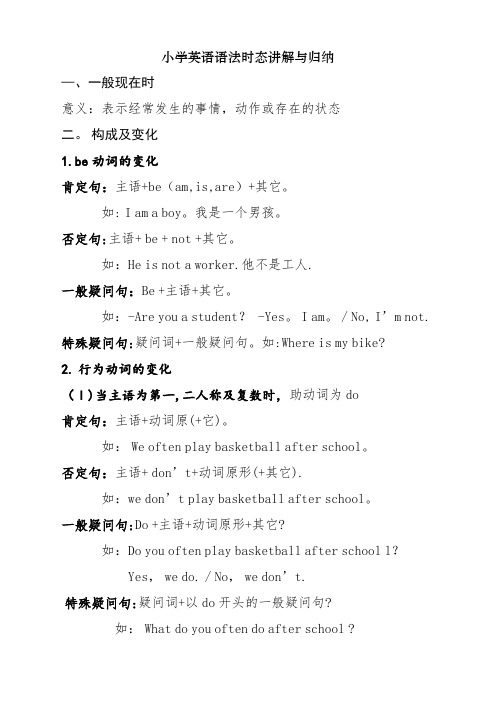
小学英语语法时态讲解与归纳—、一般现在时意义:表示经常发生的事情,动作或存在的状态二。
构成及变化1.be动词的变化肯定句:主语+be(am,is,are)+其它。
如:I am a boy。
我是一个男孩。
否定句:主语+be+not+其它。
如:He is not a worker.他不是工人.一般疑问句:Be+主语+其它。
如:-Are you a student?-Yes。
I am。
/No,I’m not.特殊疑问句:疑问词+一般疑问句。
如:Where is my bike?2.行为动词的变化(l)当主语为第一,二人称及复数时,助动词为do肯定句:主语+动词原(+它)。
如:We often play basketball after school。
否定句:主语+don’t+动词原形(+其它).如:we don’t play basketball after school。
一般疑问句:Do+主语+动词原形+其它?如:Do you often play basketball after school l?Yes,we do./No,we don’t.特殊疑问句:疑问词+以do开头的一般疑问句?如:What do you often do after school?(2)当主语为第三人称单数时,助动词为does肯定句:主语+动词三单式(+其它).如:He swims well。
否定句:主语+doesn’t+动词原形(+其它)。
如:He doesn't swim well.一般疑问句:Does+主语+动词原形+其它。
如:Does he swim well?Yes,he does。
/No,he doesn't.特殊疑问句:疑问词+以does开头的一般疑问句?如:How does your father go to work?三.第三人称单数的动词变化规则(只有在第三人称为主语的肯定句中,动词才用三单式)(1)多数动词直接加s:runs gets likes collets takes plays climbs…….(2)结尾是s,x,sh,ch,o,前为辅音字母,结尾加es:watches teaches goes does washes crossesmixes brushes(3)动词末尾y前为辅音:将y改为i加es:study→studies fly→flies carry→carries cry→cries但在y前如果为元音则直接加s:buys says四.时间标志:always,usually,often,sometimes,every…一般现在时练习He often (have) dinner at home.Daniel and Tommy (be) in Class One。
一般现在时动词三单变化规则

一般现在时动词三单变化规则一般现在时是英语语法中最基本的时态之一。
当我们谈论一种普遍的情况、习惯或者说一个真理时,我们都会用到这个时态。
在一般现在时中,动词的变化分为两种情况:一是非第三人称单数,二是第三人称单数。
一、非第三人称单数的动词变化规则:在非第三人称单数时,大多数动词的变化规则是在动词原形后面加上s或es,这取决于动词的结尾是什么。
如:I like to swim.(我喜欢游泳。
)She works hard.(她工作努力。
)They play tennis every weekend.(他们每周末打网球。
)但是,当动词的结尾是s, x, z, ch, sh等半元音或辅音加上o 时,要在动词原形后面加上es。
如:He goes to school every day.(他每天去学校。
)She fixes her bike herself.(她自己修自行车。
)The boss buzzes around the office.(老板在办公室里四处走动。
)二、第三人称单数的动词变化规则:在第三人称单数时,大多数动词的变化规则是在动词原形后面加上s或es,这取决于动词的结尾是什么。
如:He runs every morning.(他每天早上跑步。
)She reads a book before bed.(她睡前看一本书。
)The cat eats fish.(猫吃鱼。
)但是,当动词的结尾是s, x, z, ch, sh等半元音或辅音加上o 时,要在动词原形后面加上es。
另外,以辅音+y结尾的动词,要改为以i结尾,再加es。
如:He goes to school every day.(他每天去学校。
)She fixes her bike herself.(她自己修自行车。
)The boss buzzes around the office.(老板在办公室里四处走动。
)He studies hard every day.(他每天努力学习。
小升初语法复习-一般现在时(讲义)人教PEP版英语六年级下册
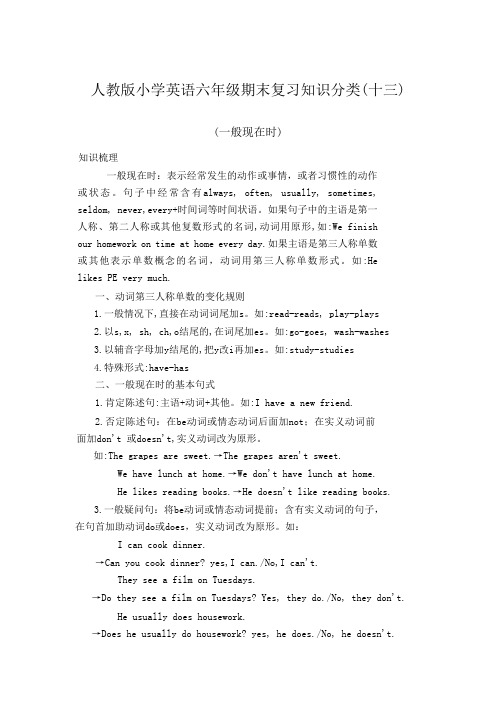
人教版小学英语六年级期末复习知识分类(十三)(一般现在时)知识梳理一般现在时:表示经常发生的动作或事情,或者习惯性的动作或状态。
句子中经常含有always, often, usually, sometimes, seldom, never,every+时间词等时间状语。
如果句子中的主语是第一人称、第二人称或其他复数形式的名词,动词用原形,如:We finishour homework on time at home every day.如果主语是第三人称单数或其他表示单数概念的名词,动词用第三人称单数形式。
如:Helikes PE very much.一、动词第三人称单数的变化规则1.一般情况下,直接在动词词尾加s。
如:read-reads, play-plays2.以s,x, sh, ch,o结尾的,在词尾加es。
如:go-goes, wash-washes3.以辅音字母加y结尾的,把y改i再加es。
如:study-studies4.特殊形式:have-has二、一般现在时的基本句式1.肯定陈述句:主语+动词+其他。
如:I have a new friend.2.否定陈述句:在be动词或情态动词后面加not;在实义动词前面加don't 或doesn't,实义动词改为原形。
如:The grapes are sweet.→The grapes aren't sweet.We have lunch at home.→We don't have lunch at home.He likes reading books.→He doesn't like reading books.3.一般疑问句:将be动词或情态动词提前;含有实义动词的句子,在句首加助动词do或does,实义动词改为原形。
如:I can cook dinner.→Can you cook dinner? yes,I can./No,I can't.They see a film on Tuesdays.→Do they see a film on Tuesdays? Yes, they do./No, they don't.He usually does housework.→Does he usuall y do housework? yes, he does./No, he doesn't.4.特殊疑问句:特殊疑问词+一般疑问句?如:He likes reading books.→What does he like?The children are from China.→Where are the children from?练习检测一、写出下列动词的第三人称单数形式。
小学英语动词第三人称单数形式用法详解

小学英语动词第三人称单数形式用法详解在英语中,动词的第三人称单数形式是指在主语为第三人称单数(he,she,it,以及单数名词)的情况下使用的动词形式。
以下是关于第三人称单数形式的用法详解:1. 一般现在时(Simple Present Tense)在一般现在时中,第三人称单数形式的动词要在原形后加上-s或-es。
例如:- She plays basketball.(她打篮球。
)- He eats an apple.(他吃一个苹果。
)- It runs fast.(它跑得很快。
)2. 带有助动词do/does的疑问句和否定句在带有助动词do或does的疑问句和否定句中,动词恢复到原来的形式,而不加-s或-es。
例如:- Does she play basketball?(她打篮球吗?)- He doesn't eat an apple.(他不吃苹果。
)3.带有情态动词的句子在使用情态动词(can,will,would,should,may等)的句子中,动词也恢复到原来的形式,而不加-s或-es。
例如:- She can swim in the pool.(她可以在泳池里游泳。
)- It may rain tomorrow.(明天可能会下雨。
)4.一些特殊的动词有些动词的第三人称单数形式不是在原形后加上-s或-es。
例如:- have → has(有)- do → does(做)- go → goes(去)- be → is(是)需要注意的是,当主语是第三人称复数时,动词恢复到原形,而不加上-s或-es。
例如:- They play basketball.(他们打篮球。
)- We eat apples.(我们吃苹果。
)。
小学英语语法——动词的单数三人称
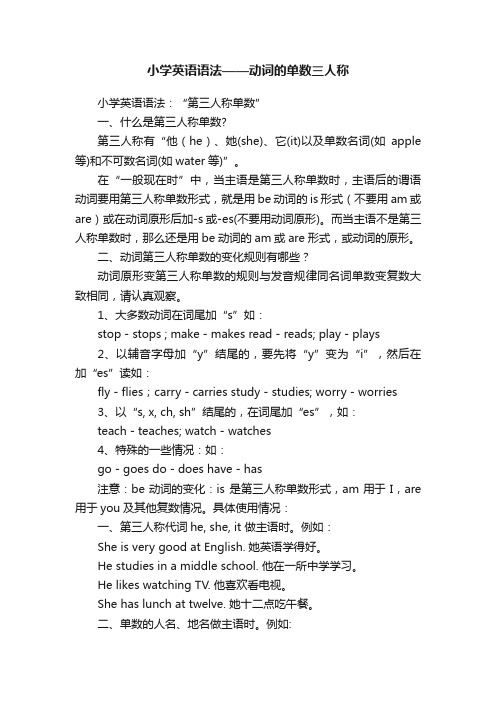
小学英语语法——动词的单数三人称小学英语语法:“第三人称单数”一、什么是第三人称单数?第三人称有“他(he)、她(she)、它(it)以及单数名词(如apple 等)和不可数名词(如water等)”。
在“一般现在时”中,当主语是第三人称单数时,主语后的谓语动词要用第三人称单数形式,就是用be动词的is形式(不要用am或are)或在动词原形后加-s或-es(不要用动词原形)。
而当主语不是第三人称单数时,那么还是用be动词的am或are形式,或动词的原形。
二、动词第三人称单数的变化规则有哪些?动词原形变第三人称单数的规则与发音规律同名词单数变复数大致相同,请认真观察。
1、大多数动词在词尾加“s”如:stop-stops ; make-makes read-reads; play-plays2、以辅音字母加“y”结尾的,要先将“y”变为“i”,然后在加“es”读如:fly-flies;carry-carries study-studies; worry-worries3、以“s, x, ch, sh”结尾的,在词尾加“es”,如:teach-teaches; watch-watches4、特殊的一些情况:如:go-goes do-does have-has注意:be动词的变化:is 是第三人称单数形式,am用于I,are 用于you及其他复数情况。
具体使用情况:一、第三人称代词he, she, it 做主语时。
例如:She is very good at English. 她英语学得好。
He studies in a middle school. 他在一所中学学习。
He likes watching TV. 他喜欢看电视。
She has lunch at twelve. 她十二点吃午餐。
二、单数的人名、地名做主语时。
例如:Jim often plays football with his friends.吉姆经常和他的朋友们踢足球。
英语语法一般现在时详细讲解

英语语法⼀般现在时详细讲解英语语法⼀般现在时详细讲解 ⼀般现在时: 1.构成:使⽤动词原形,第三⼈称单数须有变化。
(1)直接加“s”,works,takes (2)以辅⾳加“y”结尾,变“y”为“i”,再加“es” (3)以“o, s, x, ch, sh”结尾的动词加“es” goes dresses watchesbrushes 2.功能: (1)表现在的事实、状态或动作: eg?. Birds fly. ?. She loves music. ?. Mary's parents get up very early. (2)表习惯性动作或职业,常与often,sometimes,usually,always,everyweek,seldom,occasionally,frequently等时间副词连⽤。
eg ?. I always take a walk after supper. ?. She writes to me very often. ?. Tom and his girlfriend go out to take a picnic occasionally. (3)表客观真理,格⾔警句或事实: eg ?. The earth moves round the sun. ?. The sun rises in the east and sets in the west. ?. Two and two makes four. ?. No man buterrs. ⼈⾮圣贤,熟能⽆过。
(4)表将来: A.在由when,after, before,as,as soon as,although,because,if,even if,in case,till,until,unless, so long as,where,whatever,wherever 等引导的状语从句中⽤⼀般现在时表将来发⽣的动作。
复习一般现在时动词第三人称单数的用法学情分析方案
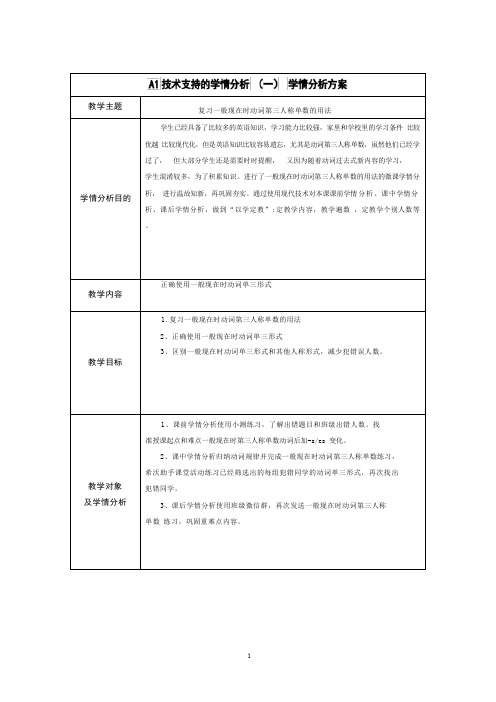
1、区别一般现在时动词单三形式和其他人称形式,减少犯错误人数。
2、动词的特殊变化,例如study-studies。
学情分析方法和工具
分析方法: 课前预习,反复听读
分析工具: 微信群,小测练习
其他
2、课中学情分析归纳动词规律并完成一般现在时动词第三人称单数练习,希沃助手课堂活动练习已经筛选出的每组犯错同学的动词单三形式,再次找出犯错同学。
3、课后学情分析使用班级微信群,再次发送一般现在时动词第三、正确使用一般现在时动词单三形式。
2、准确掌握第三人称单数。
教学内容
正确使用一般现在时动词单三形式
教学目标
1.复习一般现在时动词第三人称单数的用法
2、正确使用一般现在时动词单三形式
3、区别一般现在时动词单三形式和其他人称形式,减少犯错误人数。
教学对象及学情分析
1、课前学情分析使用小测练习,了解出错题目和班级出错人数。找准授课起点和难点一般现在时第三人称单数动词后加-s/es 变化。
教学主题
复习一般现在时动词第三人称单数的用法
学情分析目的
学生已经具备了比较多的英语知识,学习能力比较强,家里和学校里的学习条件比较优越 比较现代化。但是英语知识比较容易遗忘,尤其是动词第三人称单数,虽然他们已经学过了, 但大部分学生还是需要时时提醒, 又因为随着动词过去式新内容的学习, 学生混淆较多,为了积累知识。进行了一般现在时动词第三人称单数的用法的微课学情分析, 进行温故知新,再巩固夯实。通过使用现代技术对本课课前学情分析、课中学情分析、课后学情分析,做到“以学定教”:定教学内容,教学遍数,定教学个别人数等。
期末必看:小学英语必考40个重点知识点不看就亏大了
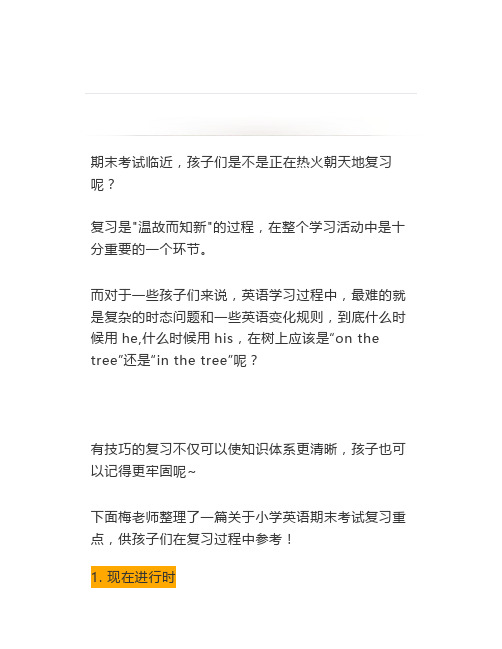
期末考试临近,孩子们是不是正在热火朝天地复习呢?复习是"温故而知新"的过程,在整个学习活动中是十分重要的一个环节。
而对于一些孩子们来说,英语学习过程中,最难的就是复杂的时态问题和一些英语变化规则,到底什么时候用he,什么时候用his,在树上应该是“on the tree”还是“in the tree”呢?有技巧的复习不仅可以使知识体系更清晰,孩子也可以记得更牢固呢~下面梅老师整理了一篇关于小学英语期末考试复习重点,供孩子们在复习过程中参考!1. 现在进行时表示正在发生的事情或进行的动作,常与now,listen,look等词连用。
结构是主语+be动词(am, is, are)+动词ing.如:It is raining now.外面正在下雨。
It is six o’clock now.现在6点了。
My parents are reading newspapers in the sitting room.我父母正在客厅看报纸。
Look! The children are having a running race now.看!孩子们正在赛跑。
问句将be动词移前,否定句在be动词后+not.2. 一般现在时表示经常反复发生的事情或动作,常与often, usually, sometimes, always, every day(week year…) 等词连用。
结构是主语+动词原形;当主语为第三人称单数即he,she, it, Tom, my mother, the boy等词时,动词后加s或es.如:We have an English lesson every day.我们每天都要上英语课。
Do the boys run faster than the girls? Yes, they do.男孩比女孩跑的快吗?是的。
问句借助于do, does否定句借助于don’t, doesn’t,后面动词一定要还原。
【英语】 一般现在时英语期末复习(word)1

【英语】一般现在时英语期末复习(word)1一、一般现在时1.You ________________ study hard if you want to get good grades.A. are supposeB. are supposedC. are supposed toD. suppose【答案】 C【解析】【分析】句意:如果你想取得好成绩,你应该努力学习。
根据be supposed to do sth.,应该做某事,固定搭配。
主语是you,be要用are,故选C。
【点评】考查固定搭配be supposed to do sth。
注意后接不定式形式。
2.I think joining the English club ________ the best way to improve your English.A. areB. wasC. isD. were【答案】 C【解析】【分析】句意:我认为加入英语俱乐部是提高英语水平的最好方法。
描述客观事实用一般现在时,主语是动名词joining,谓语是单三式,故be用is,故选C。
【点评】考查时态,注意主谓一致的用法。
3.The children will climb the mountain if it________ tomorrow.A. won't rainB. didn't rainC. isn't rainingD. doesn't rain【答案】 D【解析】【分析】句意:如果明天不下雨,孩子们会去爬山。
if 引导的条件状语从句遵循主将从现的原则,主句用一般将来时,从句用一般现在时,从句是一个否定句,含有实义动词rain的否定句,要借助助动词don't/doesn't构成,主语是it,助动词用doesn't,故选D。
【点评】考查if引导的条件状语的时态。
注意句子涉及到if引导的条件状语从句的用法。
- 1、下载文档前请自行甄别文档内容的完整性,平台不提供额外的编辑、内容补充、找答案等附加服务。
- 2、"仅部分预览"的文档,不可在线预览部分如存在完整性等问题,可反馈申请退款(可完整预览的文档不适用该条件!)。
- 3、如文档侵犯您的权益,请联系客服反馈,我们会尽快为您处理(人工客服工作时间:9:00-18:30)。
一、用所给词的正确形式填空
1、What did you do last night?
I ______to watch a movie.(go)
2、Where were you just now?
I ______ in my teacher’s office.(be)
3、Look,they are ______ the piano.(play)
4、Listen,who is ______ over there?(sing)
5、He ______ every Saturday.(dance)
6、She ______ bus to school everyday.(take)
7、Take care of the eggs,don’t break ______ .(they)
8、I don’t think they believe ______ .(we)
9、She is 25 years old,so she ______ a baby.(be not)
10、He ______ know the movie star.(do not)
二、单项选择
1、There is____ .
A.a pear B some pianos C pear D a water
2.Those____ are delicious.
A.tomatoes
B.Potatos
C.chaires
D.tomato
3.This is____ apple
A.a
B..the
C.an
D.some
4.I don’t like____ .
A .fruit B..waters C.beares D.balles
5.He said he would like to stay ____ .
A.at the home
B..at park
C.in school
D.at the park
6.She____ swimming.
A.like .
B.want to
C.likes
D.wants to
7.They ____ bokes every evening.
A.rides
B..riding
C.likes
D.wants to
8.--- What did you ____ last evening?
---I a snack.
A.does;had
B.do;have
C.did;had
D.do;had
9.---Do you often ____ your teeth?
---Yes,I do.
A.eat
B.brushing
C.brush
D.brushes
10.Do you think he can ____ up at 6:00?
A.getting
B.get
C.gets
D.got
11.---Does he often run in the park?
---Yes,he ____ everyday in the park.
A.running
B.runing
C.runs
D.run
12.___they___to music after meals?
A.Do;listen .Bdoes;listen c.do;listen D.Do;listening
13.___you at the birthday party yesterday?
No,I ___.
A.Were;was
B. was;don’t
C.Does;did
D.Were;was not
14.He sometimes ___the computer at home.
e
es
ing
ed
15.---Did you___him yesterday?
----Yes,I___him.
A.see;saw
B.saw;see
C.see;sees
D.sees;saw
16.That is ___dog.
A.his
B.he
C.him
D.it
17.Is the truck over there____ ?
A.she
B.her
C.hers
D.them
18.Could you please ____ the eraser?
A.pass I
B.pass my
C.pass me
D.pass mine
19.This dictionary is ____ .
A.I
B.me
C.mine
D.my
20.---Do you know the boy?
----No,I ____ know ____ .
A.is,him
B.doesn’t,him
C.do not,he
D.don’t,him 三.给出下列正确的缩写
1.I ________ know him.(do not)
2.He________ know her.(do not)
3.She________ a student.(is not)
4.They ________ not teachers.(is not)
5. ________ like to have some tea.(I would)
四.重新排列下列单词并组成句子。
1.movies I the like would to go to
__________________________________________ 2.bus She would like to the take
__________________________________________ 3.We like some would popcorn to eat
__________________________________________ 4.they are Are they to music
__________________________________________ 5.he Does to like play football
__________________________________________ 五.判断正误
1.I am the tallest than you.
2.I would like to dance with he.
3.She is taller than me.
4.This truck is larger than that one.
5.He look better than her.
6.Yang Ziyue is the cutest girl in her class.
7.I bought this book for her yesterday.
8.Listen,she is talk with him.
st night,I see an old man.
10.Yesterday,she saw a old man.。
